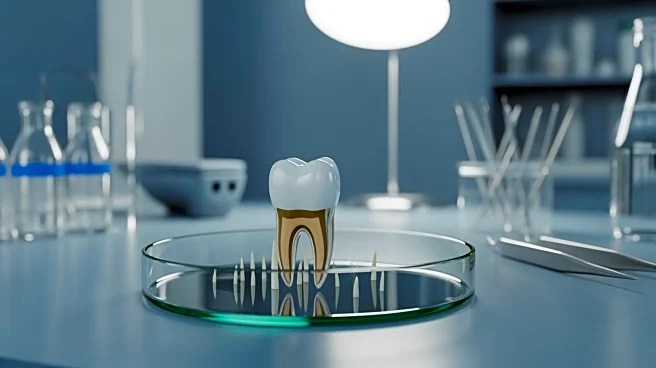What's Happening?
Researchers at King's College London, led by Ana Angelova Volponi, have made significant progress in the development of lab-grown teeth. This research, which has been ongoing for nearly two decades, aims
to create biological teeth that can be implanted into human jaws. The team has recently achieved a breakthrough by developing a new material that better mimics the natural environment where teeth grow. This advancement is crucial for replacing mouse cells with human cells in the tooth-growing process. The research involves using adult human gingival cells combined with progenitor tooth cells from a mouse embryo, housed in a hydrogel scaffold. This scaffold supports the formation of tooth-like structures, which could eventually lead to the growth of fully functional human teeth.
Why It's Important?
The development of lab-grown teeth could revolutionize dental care by providing a more natural and less invasive alternative to current dental implants. Biological teeth grown from a patient's own cells would integrate seamlessly into the jaw, reducing the risk of inflammation or rejection. This innovation could significantly improve the quality of life for individuals requiring dental replacements, offering a solution that feels and functions like natural teeth. The research also holds potential for industrial applications, as it addresses key factors in whole tooth regeneration. As more researchers contribute to this field, the possibility of clinical applications becomes more tangible, potentially transforming dental practices and patient outcomes.
What's Next?
The next steps in this research involve solving the challenge of replacing embryonic mouse cells with adult human cells. If successful, this could lead to two possible approaches for integrating lab-grown teeth into dentistry: growing a tooth to a certain stage before embedding it into the jaw, or fully growing the tooth before surgical implantation. Other research teams are also exploring different methods, such as antibody-based treatments and stem cell technologies, to promote tooth growth. As these efforts continue, the field is moving closer to making biological tooth repair or replacement a viable option within the next decade.
Beyond the Headlines
The ethical and practical implications of lab-grown teeth are significant. This technology could reduce the need for animal testing and reliance on synthetic materials in dental procedures. It also raises questions about accessibility and cost, as well as the potential for widespread adoption in dental practices. The success of this research could lead to broader applications in regenerative medicine, influencing how other organs and tissues are repaired or replaced.









